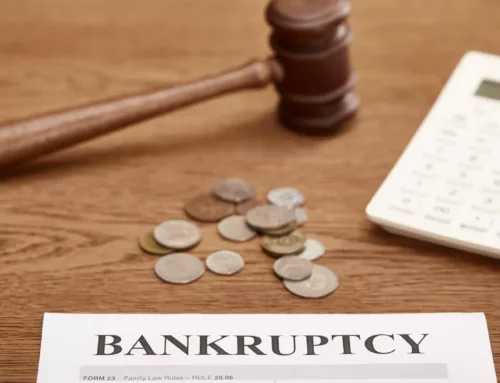Bankruptcy allows you to repay your debts, restructure your finances, and aim for debt settlement. However, it has a huge impact on your credit score. This number indicates the level of your creditworthiness. Bankruptcy generally stays on your credit report for a maximum of ten years depending on the type of bankruptcy that you have filed. A Chapter 7 bankruptcy can stay on your credit history for a full ten years, while Chapter 13 bankruptcy will remain for not more than seven years since it involves repayment of some of your outstanding debts. Bankruptcy can indeed hurt your credit score; however, its effect will gradually fade with time.
Rebuilding credit doesn’t happen overnight. It requires a lot of hard work and patience to improve your credit score. The process can be complex and time-consuming, but it will surely be worth it in the end. You need to prove to creditors that you are still capable of making future payments for a loan or mortgage even after bankruptcy. You can rebuild your credit by raising your credit score little by little. An experienced Wyandotte bankruptcy attorney can help you take small steps to rebuild positive credit history.
In this article, you will learn the different ways on how to rebuild your credit after bankruptcy. Here are some of the useful strategies:
- Always Pay on Time
- Control Your Credit Utilization
- Use a Secured Credit Card
- Apply for a Credit-Builder Loan or Secured Loan
- Be an Authorized User
- Get a Co-Signer
- Monitor Your Credit Report
Always Pay on Time

You may also consider setting up automatic payments or payment reminders to help ensure you aren’t ever late with a payment. Keep in mind that your payment history is the most important factor for rebuilding your credit. All the details of your payment such as on-time, late, or missed payments will reflect on your payment history.
Control Your Credit Utilization
The credit utilization ratio is the percentage of your total available credit that you currently use. This ratio can go up and down depending on your payments and purchases. The amount of your available credit limit has a significant effect on your credit score. It is a factor used by credit reporting agencies to compute your credit score. A high ratio can reflect poorly on your credit history. On the other hand, lowering your credit utilization ratio can help improve your credit score. It is advisable not to use more than 30% of your credit card limit. A reliable Wyandotte bankruptcy lawyer can help you maintain the ideal credit utilization ratio.
Use a Secured Credit Card
If you have closed all your previous credit card accounts, you can start over by applying for a new secured credit card. A secured credit card is a type of credit card that is backed by a cash deposit from the cardholder. This deposit acts as collateral, providing the card issuer with security in case you fail to make monthly payments. The amount of your deposit is usually your credit limit.
With a secured card, you give the bank a certain amount of money as a deposit in exchange for a credit card you can use to make purchases. You have to make sure that your card issuer will report your monthly payments to all the major credit-reporting bureaus.
Once you have obtained a secured credit card, you must use it responsibly for several months or years to establish your credit history and boost your credit score. If you can maintain positive payment history, your card lenders may increase your credit limit.
Apply for a Credit-Builder Loan or Secured Loan
A credit builder loan can be a great tool to build credit from scratch or improve low credit scores. This type of loan is usually offered by small financial institutions such as community banks or credit unions. With this type of loan, a lender doesn’t give you access to money you’ve agreed to borrow until you’ve paid for the loan in full. Once you receive the loan amount, the lender will report your payment history to the credit reporting agencies. This helps you rebuild credit because you’re creating a positive history of on-time loan payments.
Be an Authorized User
Your family and friends can help you build your credit by opening a joint account with you or assigning you as an authorized user of their credit accounts. Your credit can improve by just being on the account without the need to access it. The primary cardholder can add you as an authorized user even if you don’t have the account details. Missed payments on a joint account will hurt you both. You will be negatively affected in case you and the primary cardholder fail to pay bills on time.
Get a Co-Signer
If you find it difficult to obtain credit, you may request your qualified family member or friend to become your co-signer for a credit card or mortgage. This is a great way to begin establishing credit, however, it can be risky because the credit reputation of your chosen co-signer will be on the line. Your co-signer shall also be held responsible for the loan repayment in case you fail to pay according to the loan terms.
Monitor Your Credit Report
You must ensure that your credit report is accurate and free from errors. All the information must be true and complete. If you notice any incorrect information on your credit report, you must start the process of correcting all errors with both creditors and credit reporting agencies, which could help your bad credit improve. It is important to take a copy of your credit reports from any of the three major credit reporting bureaus to be able to monitor them regularly.
How Long Does It Take to Rebuild Credit?
Rebuilding your credit doesn’t happen in a blink of an eye. It takes time to re-establish a good payment history, pay off your outstanding debts and let negative information cycle off your credit report. The length of your credit rebuilding process will depend on the severity of the negative history that drags down your credit score. For instance, bankruptcy usually stays on your credit report for up to ten years, while missed or late payments and collections remain on your credit report for seven years.
The Role of a Bankruptcy Lawyer
Bankruptcy doesn’t erase your bad credit history, but it gives you a second chance to start over. There are various ways on how to repair your credit gradually. For legal help in rebuilding your credit, do not hesitate to consult our competent Wyandotte bankruptcy attorneys at Hammerschmidt Stickradt & Associates. We will help you choose the best credit repair strategies that will fix your credit and get a good credit score after your bankruptcy discharge. We will review your credit report with you and explain how credit scoring works. Together, we’ll devise a plan that will help improve your credit score and maintain a positive credit history.



